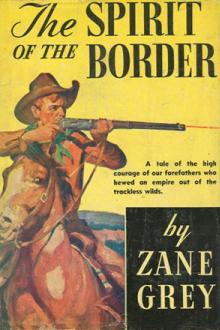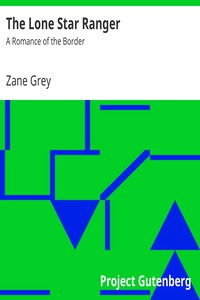Desert Gold, Zane Grey [best book series to read TXT] 📗

- Author: Zane Grey
Book online «Desert Gold, Zane Grey [best book series to read TXT] 📗». Author Zane Grey
DESERT GOLD A ROMANCE OF THE BORDER
BY ZANE GREY
CONTENTS Prologue I. Old Friends II. Mercedes Castaneda III. A Flight Into The Desert IV. Forlorn River V. A Desert Rose VI. The Yaqui VII. White Horses VIII. The Running of Blanco Sol IX. An Interrupted Siesta X. Rojas XI. Across Cactus and Lava XII. The Crater of Hell XIII. Changes at Forlorn River XIV. A Lost Son XV. Bound In The Desert XVI. Mountain Sheep XVII. The Whistle of a Horse XVIII. Reality Against Dreams XIX. The Secret of Forlorn River XX. Desert Gold
D E S E R T G O L D
PROLOGUE I
A FACE haunted Cameron—a woman's face. It was there in the white heart of the dying campfire; it hung in the shadows that hovered over the flickering light; it drifted in the darkness beyond.
This hour, when the day had closed and the lonely desert night set in with its dead silence, was one in which Cameron's mind was thronged with memories of a time long past—of a home back in Peoria, of a woman he had wronged and lost, and loved too late. He was a prospector for gold, a hunter of solitude, a lover of the drear, rock-ribbed infinitude, because he wanted to be alone to remember.
A sound disturbed Cameron's reflections. He bent his head listening. A soft wind fanned the paling embers, blew sparks and white ashes and thin smoke away into the enshrouding circle of blackness. His burro did not appear to be moving about. The quiet split to the cry of a coyote. It rose strange, wild, mournful—not the howl of a prowling upland beast baying the campfire or barking at a lonely prospector, but the wail of a wolf, full-voiced, crying out the meaning of the desert and the night. Hunger throbbed in it—hunger for a mate, for offspring, for life. When it ceased, the terrible desert silence smote Cameron, and the cry echoed in his soul. He and that wandering wolf were brothers.
Then a sharp clink of metal on stone and soft pads of hoofs in sand prompted Cameron to reach for his gun, and to move out of the light of the waning campfire. He was somewhere along the wild border line between Sonora and Arizona; and the prospector who dared the heat and barrenness of that region risked other dangers sometimes as menacing.
Figures darker than the gloom approached and took shape, and in the light turned out to be those of a white man and a heavily packed burro.
"Hello there," the man called, as he came to a halt and gazed about him. "I saw your fire. May I make camp here?"
Cameron came forth out of the shadow and greeted his visitor, whom he took for a prospector like himself. Cameron resented the breaking of his lonely campfire vigil, but he respected the law of the desert.
The stranger thanked him, and then slipped the pack from his burro. Then he rolled out his pack and began preparations for a meal. His movements were slow and methodical.
Cameron watched him, still with resentment, yet with a curious and growing interest. The campfire burst into a bright blaze, and by its light Cameron saw a man whose gray hair somehow did not seem to make him old, and whose stooped shoulders did not detract from an impression of rugged strength.
"Find any mineral?" asked Cameron, presently.
His visitor looked up quickly, as if startled by the sound of a human voice. He replied, and then the two men talked a little. But the stranger evidently preferred silence. Cameron understood that. He laughed grimly and bent a keener gaze upon the furrowed, shadowy face. Another of those strange desert prospectors in whom there was some relentless driving power besides the lust for gold! Cameron felt that between this man and himself there was a subtle affinity, vague and undefined, perhaps born of the divination that here was a desert wanderer like himself, perhaps born of a deeper, an unintelligible relation having its roots back in the past. A long-forgotten sensation stirred in Cameron's breast, one so long forgotten that he could not recognize it. But it was akin to pain.
II
When he awakened he found, to his surprise, that his companion had departed. A trail in the sand led off to the north. There was no water in that direction. Cameron shrugged his shoulders; it was not his affair; he had his own problems. And straightway he forgot his strange visitor.
Cameron began his day, grateful for the solitude that was now unbroken, for the canyon-furrowed and cactus-spired scene that now showed no sign of life. He traveled southwest, never straying far from the dry stream bed; and in a desultory way, without eagerness, he hunted for signs of gold.
The work was toilsome, yet the periods of rest in which he indulged were not taken because of fatigue. He rested to look, to listen, to feel. What the vast silent world meant to him had always been a mystical thing, which he felt in all its incalculable power, but never understood.
That day, while it was yet light, and he was digging in a moist white-bordered wash for water, he was brought sharply up by hearing the crack of hard hoofs on stone. There down the canyon came a man and a burro. Cameron recognized them.
"Hello, friend," called the man, halting. "Our trails crossed again. That's good."
"Hello," replied Cameron, slowly. "Any mineral sign to-day?"
"No."
They made camp together, ate their frugal meal, smoked a pipe, and rolled in their blankets without exchanging many words. In the morning the same reticence, the same aloofness characterized the manner of both. But Cameron's companion, when he had packed his burro and was ready to start, faced about and said: "We might stay together, if it's all right with you."
"I never take a partner," replied Cameron.
"You're alone; I'm alone," said the other, mildly. "It's a big place. If we find gold there'll be enough for two."
"I don't go down into the desert for gold alone," rejoined Cameron, with a chill note in his swift reply.
His companion's deep-set, luminous eyes emitted a singular flash. It moved Cameron to say that in the years of his wandering he had met no man who could endure equally with him the blasting heat, the blinding dust storms, the wilderness of sand and rock and lava and cactus, the terrible silence and desolation of the desert. Cameron waved a hand toward the wide, shimmering, shadowy descent of plain and range. "I may strike through the Sonora Desert. I may head for Pinacate or north for the Colorado Basin. You are an old man."
"I don't know the country, but to me one place is the same as another," replied his companion. For moments he seemed to forget himself, and swept his far-reaching gaze out over the colored gulf of stone and sand. Then with gentle slaps he drove his burro in behind Cameron. "Yes, I'm old. I'm lonely, too. It's come to me just lately. But, friend, I can still travel, and for a few days my company won't hurt you."
"Have it your way," said Cameron.
They began a slow march down into the desert. At sunset they camped under the lee of a low mesa. Cameron was glad his comrade had the Indian habit of silence. Another day's travel found the prospectors deep in the wilderness. Then there came a breaking of reserve, noticeable in the elder man, almost imperceptibly gradual in Cameron. Beside the meager mesquite campfire this gray-faced, thoughtful old prospector would remove his black pipe from his mouth to talk a little; and Cameron would listen, and sometimes unlock his lips to speak a word. And so, as Cameron began to respond to the influence of a desert less lonely than habitual, he began to take keener note of his comrade, and found him different from any other he had ever encountered in the wilderness. This man never grumbled at the heat, the glare, the driving sand, the sour water, the scant fare. During the daylight hours he was seldom idle. At night he sat dreaming before the fire or paced to and fro in the gloom. He slept but little, and that long after Cameron had had his own rest. He was tireless, patient, brooding.
Cameron's awakened interest brought home to him the realization that for years he had shunned companionship. In those years only three men had wandered into the desert with him, and these had left their bones to bleach in the shifting sands. Cameron had not cared to know their secrets. But the more he studied this latest comrade the more he began to suspect that he might have missed something in the others. In his own driving passion to take his secret into the limitless abode of silence and desolation, where he could be alone with it, he had forgotten that life dealt shocks to other men. Somehow this silent comrade reminded him.
One afternoon late, after they had toiled up a white, winding wash of sand and gravel, they came upon a dry waterhole. Cameron dug deep into the sand, but without avail. He was turning to retrace weary steps back to the last water when his comrade asked him to wait. Cameron watched him search in his pack and bring forth what appeared to be a small, forked branch of a peach tree. He grasped the prongs of the fork and held them before him with the end standing straight out, and then he began to walk along the stream bed. Cameron, at first amused, then amazed, then pitying, and at last curious, kept pace with the prospector. He saw a strong tension of his comrade's wrists, as if he was holding hard against a considerable force. The end of the peach branch began to quiver and turn. Cameron reached out a hand to touch it, and was astounded at feeling a powerful vibrant force pulling the branch downward. He felt it as a magnetic shock. The branch kept turning, and at length pointed to the ground.
"Dig here," said the prospector.
"What!" ejaculated Cameron. Had the man lost his mind?
Then Cameron stood by while his comrade dug in the sand. Three feet he dug—four—five, and the sand grew dark, then moist. At six feet water began to seep through.
"Get the little basket in my pack," he said.
Cameron complied, and saw his comrade drop the basket into the deep hole, where it kept the sides from caving in and allowed the water to seep through. While Cameron watched, the basket filled. Of all the strange incidents of his desert career this was the strangest. Curiously he picked up the peach branch and held it as he had seen it held. The thing, however, was dead in his hands.
"I see you haven't got it," remarked his comrade. "Few men have."
"Got what?" demanded Cameron.
"A power to find water that way. Back in Illinois an old German used to do that to locate wells. He showed me I had the same power. I can't explain. But you needn't look so dumfounded. There's nothing supernatural about it."
"You mean it's a simple fact—that some men have a magnetism, a force or power to find water as you did?"
"Yes. It's not unusual on the farms back in Illinois, Ohio, Pennsylvania. The old German I spoke of made money traveling round with his peach fork."
"What a gift for a man in the desert!"
Cameron's comrade smiled—the second time in all those days.
They entered a region where mineral abounded, and their march became slower. Generally they took the course of a wash, one on each side, and let the burros travel leisurely along nipping at the bleached blades of scant grass, or at sage or cactus, while they searched in the canyons and under the ledges for signs of gold. When they found any rock that hinted of gold they picked off a piece and





Comments (0)